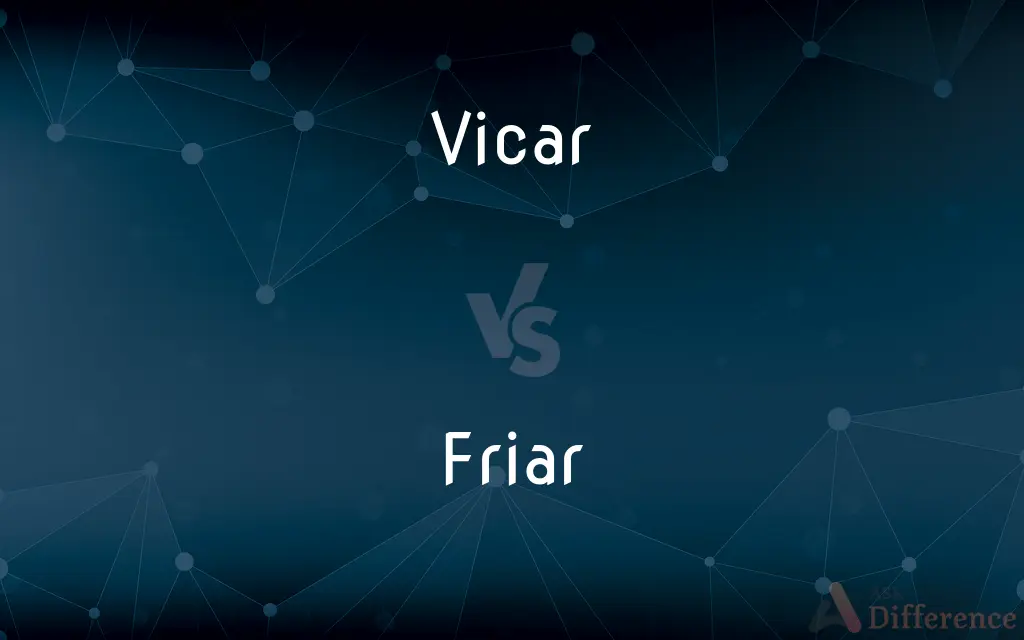Vicar vs. Friar — What's the Difference?
By Fiza Rafique & Urooj Arif — Updated on April 5, 2024
A vicar is a representative of any ecclesiastic authority, while a friar is a member of a mendicant religious order.

Difference Between Vicar and Friar
Table of Contents
ADVERTISEMENT
Key Differences
Vicars are clerics who serve as substitutes or agents for a higher church authority, often running a church or parish in the name of the diocesan bishop. They perform sacraments and hold services. On the other hand, friars belong to religious orders that emphasize community life, poverty, and direct engagement with the public, such as preaching and charitable work.
While vicars are more commonly found within the Anglican, Lutheran, and some other Protestant churches, friars are associated with the Roman Catholic Church, particularly within orders like the Franciscans, Dominicans, Carmelites, and Augustinians. Friars take vows of poverty, chastity, and obedience, living in communities that focus on public ministry.
Vicars receive their authority and assignments from their bishop or ecclesiastical authority, often working within a specific church or parish. They may receive a stipend or salary for their duties. Conversely, friars may rely on donations or the support of their religious community for their livelihood, and their work often takes them beyond the confines of a church.
Another key difference lies in their lifestyle and duties. Vicars are primarily focused on the administration and spiritual needs of their parish or community, including conducting services, marriages, funerals, and baptisms. Friars, while also capable of performing many of these duties, especially if they are priests, typically focus more on missionary work, education, and serving the needy.
The roles of vicars and friars also differ in terms of their engagement with the world. Vicars are often seen as leaders within their community, with a stable role and position. Friars, in contrast, are more itinerant, sometimes moving from place to place to carry out their order’s mission, which can involve preaching, teaching, and other forms of outreach.
ADVERTISEMENT
Comparison Chart
Affiliation
Anglican, Lutheran, and some Protestant churches
Roman Catholic orders (e.g., Franciscans, Dominicans)
Lifestyle
Parish-based, may live in a vicarage
Community-based, often in a friary or monastery
Duties
Conducting services, pastoral care, administration
Preaching, teaching, charitable works
Source of Income
Stipend or salary from the church
Support from the religious order or public donations
Vows
No vows of poverty, chastity, and obedience (in general)
Vows of poverty, chastity, and obedience
Compare with Definitions
Vicar
In the Anglican Church, a priest in charge of a parish.
The vicar organized a community outreach program for the holidays.
Friar
A brother of a mendicant order, such as the Franciscans or Dominicans.
Friars from the local monastery organized a food drive in the neighborhood.
Vicar
A substitute or deputy in various capacities.
The vicar of the bishop presided over the confirmation ceremony.
Friar
A member of a religious order who lives a communal life in a monastery, dedicated to poverty, chastity, and obedience.
The friar spent his mornings in prayer and his afternoons serving the poor.
Vicar
A cleric acting as a local representative of a higher ecclesiastical authority.
The vicar at St. Mary's parish conducted the Sunday service.
Friar
A mendicant preacher, especially in medieval Europe.
The friar traveled from town to town preaching the Gospel.
Vicar
In the Church of England, a clergyman receiving a stipend but not the tithes of a parish.
As a vicar, he was deeply involved in the life of his parish community.
Friar
A member of a religious community who focuses on public ministry and service.
Friars often work in education and social services, living their faith through action.
Vicar
An ecclesiastical agent or representative.
The vicar was appointed to manage the affairs of the absent bishop.
Friar
A religious brother committed to a life of poverty and service.
The friar’s vow of poverty meant he owned nothing personally.
Vicar
A vicar (; Latin: vicarius) is a representative, deputy or substitute; anyone acting "in the person of" or agent for a superior (compare "vicarious" in the sense of "at second hand"). Linguistically, vicar is cognate with the English prefix "vice", similarly meaning "deputy".
Friar
A friar is a brother and a member of one of the mendicant orders founded in the twelfth or thirteenth century; the term distinguishes the mendicants' itinerant apostolic character, exercised broadly under the jurisdiction of a superior general, from the older monastic orders' allegiance to a single monastery formalized by their vow of stability. The most significant orders of friars are the Dominicans, Franciscans, Augustinians and Carmelites.
Vicar
(in the Church of England) an incumbent of a parish where tithes formerly passed to a chapter or religious house or layperson.
Friar
A member of a usually mendicant Roman Catholic order.
Vicar
An Anglican parish priest in a parish where historically someone other than the priest was entitled to the tithes.
Friar
A member of a mendicant Christian order such as the Augustinians, Carmelites (white friars), Franciscans (grey friars) or the Dominicans (black friars).
Vicar
A cleric in charge of a chapel in the Episcopal Church of the United States.
Friar
A white or pale patch on a printed page caused by poor inking.
Vicar
An Anglican or Roman Catholic cleric who acts for or represents another, often higher-ranking member of the clergy.
Friar
An American fish, the silverside.
Vicar
In the Church of England, the priest of a parish, receiving a salary or stipend but not tithes.
Friar
A brother or member of any religious order, but especially of one of the four mendicant orders, viz: (a) Minors, Gray Friars, or Franciscans. (b) Augustines. (c) Dominicans or Black Friars. (d) White Friars or Carmelites. See these names in the Vocabulary.
Vicar
In the Roman Catholic and some other churches, a cleric acting as local representative of a higher ranking member of the clergy.
Friar
A white or pale patch on a printed page.
Vicar
A person acting on behalf of, or representing, another person.
Friar
An American fish; the silversides.
Vicar
One deputed or authorized to perform the functions of another; a substitute in office; a deputy.
Friar
A male member of a religious order that originally relied soley on alms
Vicar
The incumbent of an appropriated benefice.
Vicar
A Roman Catholic priest who acts for another higher-ranking clergyman
Vicar
(Episcopal Church) a clergyman in charge of a chapel
Vicar
(Church of England) a clergyman appointed to act as priest of a parish
Common Curiosities
What is a vicar?
A vicar is a clergy member representing ecclesiastical authority, often in charge of a parish.
What kind of work do friars do?
Friars engage in preaching, teaching, and charitable work, often outside of traditional parish settings.
Where do vicars receive their authority?
Vicars receive their authority from the bishop or ecclesiastical authority of their denomination.
What is a friar?
A friar is a member of a mendicant religious order in the Catholic Church, committed to community life and public ministry.
How do vicars and friars differ in their living situations?
Vicars often live in a parish or vicarage, while friars live in communities, such as friaries or monasteries.
What are the main duties of a vicar?
Vicars focus on conducting services, pastoral care, and parish administration.
What is the difference between a friar and a monk?
Monks live a cloistered, contemplative life in a monastery, while friars are more involved in public ministry.
Can vicars get married?
Yes, in many denominations, vicars can marry and have families.
Are all friars priests?
Not all friars are priests; some are brothers who focus on various ministries without being ordained.
Do vicars take vows of poverty, chastity, and obedience?
Generally, vicars do not take these vows, unlike friars who do.
How do friars support themselves?
Friars are supported by their religious order or through donations from the public.
Can vicars change parishes?
Yes, vicars can be assigned to different parishes by their ecclesiastical authority.
Are there female vicars or friars?
There are female vicars in many Christian denominations, but traditional Catholic friar orders are male-only, although there are female equivalents, such as nuns and sisters.
Can friars be found in Protestant denominations?
Friars are primarily associated with the Catholic Church and its religious orders.
How does the community role of a vicar differ from that of a friar?
Vicars serve a specific parish community, while friars may serve broader communities and engage in more itinerant ministries.
Share Your Discovery

Previous Comparison
Lodger vs. Boarder
Next Comparison
Camel vs. DromedaryAuthor Spotlight
Written by
Fiza RafiqueFiza Rafique is a skilled content writer at AskDifference.com, where she meticulously refines and enhances written pieces. Drawing from her vast editorial expertise, Fiza ensures clarity, accuracy, and precision in every article. Passionate about language, she continually seeks to elevate the quality of content for readers worldwide.
Co-written by
Urooj ArifUrooj is a skilled content writer at Ask Difference, known for her exceptional ability to simplify complex topics into engaging and informative content. With a passion for research and a flair for clear, concise writing, she consistently delivers articles that resonate with our diverse audience.
















































